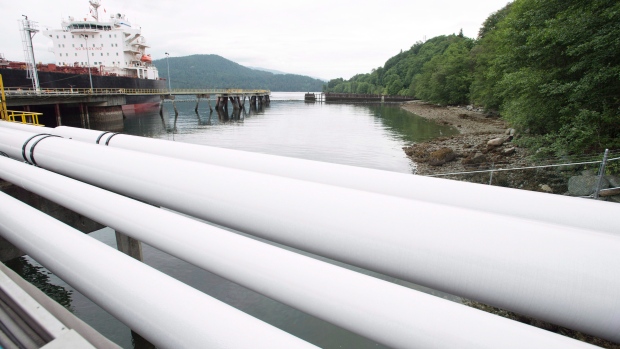Nov 30, 2016
Three things that could still kill the $6.8B Trans Mountain project

Popping the champagne may be premature for supporters of the Trans Mountain pipeline expansion. While the $6.8 billion plan to nearly triple capacity of the line that has been operating between Edmonton and Vancouver since 1953 now has all the government approvals it needs to begin construction, there is still no guarantee that is going to happen. Below, BNN takes a look at some of the major barriers Trans Mountain will need to break through in order to get built.
ECONOMICS
Just because Ottawa is allowing Texas-based Kinder Morgan to move forward, that doesn’t mean the company will automatically decide spending $6.8 billion to build it is still in its interest. The company first proposed the expansion in early 2013 when oil prices were more than double their current levels and much has changed in the pipeline space since then. While the company has never swayed in its staunch support for approval, deciding not to move forward would not be without precedent. Earlier this year, the Pacific Northwest LNG project won final approval from the federal government to build a $12 billion natural gas export hub just outside of Prince Rupert, British Columbia. Yet Petronas – the Malaysian energy giant leading the consortium behind the project – has yet to make a final investment decision on whether to move forward. Analysts believe a positive decision from the company is possible, though far from likely.
OPPOSITION
Elizabeth May, leader of the Green Party of Canada and a sitting member of the House of Commons, perhaps best exemplifies the intensity of resistance allowing Trans Mountain to expand unencumbered. Appearing on CTV’s Power Play just moments after Prime Minister Justin Trudeau announced his government’s decision, the federal lawmaker declared her willingness to “go to jail” in order to prevent the plan from advancing. “As long as there’s breath in my body, I’ll fight this damn thing.” Already, hundreds of protestors have taken to the streets of Vancouver to rally against the project and their mayor, Gregor Robertson, openly supports their aims. Robertson even released a statement calling the approval “a big step backwards for Canada’s environment and economy.” And remember, all of that opposition would need to be overcome in addition to several legal challenges, many of which are already before the courts. For anyone who doubts whether such challenges can be effective, remember the Northern Gateway pipeline also had all the necessary government approvals to move ahead as recently as one year ago. Then, in June of this year, the Federal Court of Appeal quashed those approvals, citing a lack of consultation. Ottawa did add four months of additional consultation for the Trans Mountain review, but there is no reason to believe that is enough to satisfy the courts.
LOGISTICS
Even if the Kinder Morgan board of directors approves spending the money necessary to build the Trans Mountain expansion, and even if the large and powerful base of opposition to the project fails in its efforts to block construction, there is still the very basis – though very real – issue of how the expanded pipeline would actually work. As BNN’s Ian Vandaelle explained to colleagues late Tuesday evening, the largest oil tankers capable of entering the Port of Vancouver can only hold roughly 550,000 barrels of oil or just a fraction of what the largest (and therefore most economic) tankers can haul. That lower economy of scale means producers would have to take lower prices than they otherwise would. While those prices would still definitely be higher than what producers receive currently, the new tolls Kinder Morgan is likely to charge shippers to help cover the cost of construction will absolutely complicate the economics involved. Then there is the question of whether energy-hungry Asian markets will still want Canadian crude once the expansion comes online around 2020. China in particular has been satisfying its crude cravings through increased imports from central Asia and Russia while it has been waiting for Canada to get its export act together.



